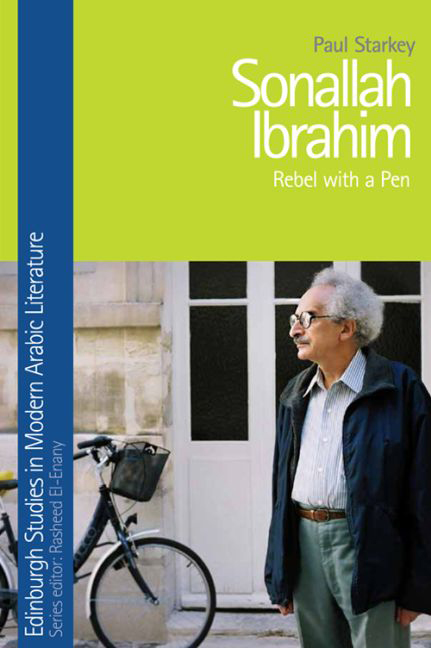Book contents
- Frontmatter
- Contents
- Series Editor's Foreword
- Preface
- 1 Introduction: Background and Context
- 2 Rebel with a Pen
- 3 Cairo Prison: Tilka al-raʾiha (1966)
- 4 Michelangelo and the Dam: Najmat Aghustus (1974)
- 5 CocaColaland: al-Lajna (1981)
- 6 War in Lebanon: Bayrut, Bayrut (1984)
- 7 Consumer Society: Dhat (1992)
- 8 Prison of Dishonour: Sharaf (1997)
- 9 Widening Horizons (1): Sex, Memory and Revolution: Warda (2000)
- 10 Widening Horizons (2): In the Land of the Capitalists: Amrikanli (Amri Kan Li) (2003)
- 11 Return to Childhood: al-Talassus (2007)
- 12 The French Connection: al-ʿImama wa-al-Qubbaʿa (2008) and al-Qanun al-Faransi (2008)
- 13 Filling a Gap: al-Jalid (2011)
- 14 Epilogue
- Bibliography
- Index
11 - Return to Childhood: al-Talassus (2007)
Published online by Cambridge University Press: 23 September 2017
- Frontmatter
- Contents
- Series Editor's Foreword
- Preface
- 1 Introduction: Background and Context
- 2 Rebel with a Pen
- 3 Cairo Prison: Tilka al-raʾiha (1966)
- 4 Michelangelo and the Dam: Najmat Aghustus (1974)
- 5 CocaColaland: al-Lajna (1981)
- 6 War in Lebanon: Bayrut, Bayrut (1984)
- 7 Consumer Society: Dhat (1992)
- 8 Prison of Dishonour: Sharaf (1997)
- 9 Widening Horizons (1): Sex, Memory and Revolution: Warda (2000)
- 10 Widening Horizons (2): In the Land of the Capitalists: Amrikanli (Amri Kan Li) (2003)
- 11 Return to Childhood: al-Talassus (2007)
- 12 The French Connection: al-ʿImama wa-al-Qubbaʿa (2008) and al-Qanun al-Faransi (2008)
- 13 Filling a Gap: al-Jalid (2011)
- 14 Epilogue
- Bibliography
- Index
Summary
The appearance of al-Talassus in 2007 represented something of a shift in direction in Sonallah Ibrahim's sequence of novels. Generally regarded as one of the least political and most personal of the author's novels, it is set not in post-revolutionary Egypt, as most of its predecessors had been, but in the dying days of the Egyptian monarchy, towards the end of the 1940s – a time when Sonallah Ibrahim himself was some ten or eleven years old.
Publication and Translations
The text of al-Talassus was published in Cairo in 2003 by Dar al-Mustaqbal al-ʿArabi, the house that had published the majority of the author's novels first released in Cairo, with the exception of Sharaf. An English translation by Hosam Aboul-Ela entitled Stealth (a somewhat controversial rendering of the title, for a discussion of which see below) was published in London by Aflame in 2010, but the company went bankrupt in 2012; the English translation was subsequently republished in the USA by New Directions in 2014. A French translation by Richard Jacquemond under the title Le Petit Voyeur was published by Actes Sud in 2008. To my knowledge, there are to date no translations into other languages.
Background
In terms of the author's relation to the events described, the background to al-Talassus needs little elaboration: we are clearly faced with an attempt to recreate, at both a personal and a national/societal level, a period of the past through which the author lived. The work is labelled riwāya (‘novel’) on the cover, but like many of the author's previous novels, though not an autobiography in the strict sense of the word, it is clearly closely based on the author's own experience.
The relationship between the work itself and the author's own life has been made quite explicit in interviews by the author himself, who in 2013, for example, noted that ‘Stealth is not a memoir, it is fiction based on some facts’. As an example of the way in which fact has been transformed into fiction, he explains that:
We had a servant at home, a girl. My father was treating her nicely and I was jealous. Reaching the same age as my father at the time, I understood his situation.
- Type
- Chapter
- Information
- Sonallah IbrahimRebel with a Pen, pp. 171 - 188Publisher: Edinburgh University PressPrint publication year: 2016



